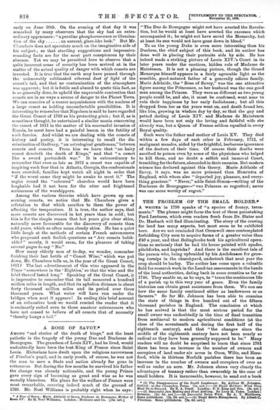A ROSE OF SAVOY.*
AMONG "sad stories of the death of kings," not the least pathetic is the tragedy of the young Duo and Duchesse de Bourgogne. The grandson of Louis XPir., had he lived, would undoubtedly have been the best King of France since Saint Louis. Historians have dwelt upon the religious narrowness of Fenelon's pupil, and in early youth, of course, he was not the man to save a State and nation already far gone in rottenness. But during the few months he survived his father the change was already noticeable, and the young Prince gave every sign of becoming as great and wise as he was morally blameless. His plans for the welfare of France were most remarkable, covering indeed much of the ground of 1789. Mr. Noel Williams is probably right when he says : • A Bose of Savoy: Marie Aditaide of Savoy, Duchesss de Bourgogne, Mother of &mai FT% By 11. Noel Williams. London Methuen and Co. [15s. net.]
"The Due de Bourgogne might not have averted the Revolu- tion, but he would at least have averted the excesses which accompanied it; he might not have saved the Monarchy, but at least its sun would not have gone down in blood."
To us the young Duke is even more interesting than his Duchess, the chief subjeet of this book, and its author has done well in placing their portraits side by side. He has indeed made a striking picture of Louis XIV.'s Court in its later years under the cautions, hidden rule of Madame de Maintenon. It is not a pleasing picture, though the Grand Monarque himself appears in a fairly agreeable light as the sensible, good-natured father of a generally odious family. Marie Adelaide, the "Rose of Savoy," was the one attractive figure among the Princesses, as her husband was the one good man among the Princes. They were as different as two young people could be, and she, it must be confessed, went near to ruin their happiness by her early foolishness ; but all this dropped from her as the years went on, and death found her, like him, growing in wisdom day by day, so that the gay and petted darling of Louis XIV. and Madame de Ifaintenon would have been not only the loving and faithful wife she already was, but a Queen of France seldom equalled in every Royal quality.
Such were the father and mother' of Louis XV. They died within a few days of each other in February, 1712, of malignant measles, aided by the frightful, barbarous ignorance of the doctors of their time. Of course their deaths were ascribed to poison even by some of the physicians who helped to kill them, and no doubt a selfish and immoral Court, trembling for the future, abounded in their enemies!. But modern science has declared against this theory. Marie Adelaide of Savoy, it says, was no more poisoned than Henrietta of England, with whom also "departed joy, pleasure, and every- thing gracious." "Never," adds Saint-Simon—writing of the Duchesse de Dourgogne—" was Princess so regretted ; never was one more worthy of regret." -
























































 Previous page
Previous page